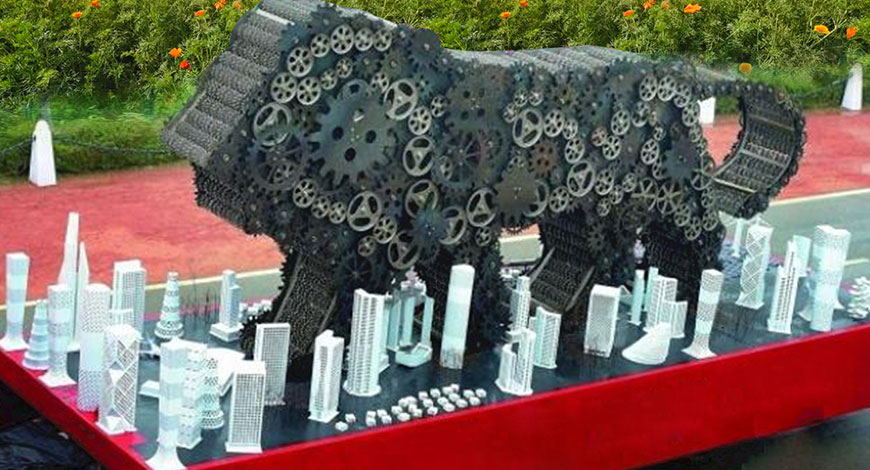Current News
Incentivizing large-scale manufacturing

The Indian government has identified the medical devices as a priority sector for the flagship Make in India program and is committed to strengthen the manufacturing ecosystem. India is the fourth largest medical devices market in Asia. The Atmanirbhar Bharat mission is providing an impetus to India’s vision of becoming a global manufacturing hub for medical devices.
Recent initiatives for instance, the Production Linked Incentive (PLI) scheme for medical devices and pharmaceuticals, and Promotion of Medical Devices Parks Scheme, are a testimony to this. The schemes have been cogently constructed to incentivize large-scale manufacturing and to build required infrastructure for developing manufacturing clusters within India.
Promoting domestic manufacturing of medical devices
The medical devices manufacturing sector faces lack of a level playing field in India vis-à-vis competing economies. The medical devices manufacturing sector suffers from a considerable cost of manufacturing disability, among other things, on account of: lack of adequate infrastructure, domestic supply chain, and logistics; high cost of finance; inadequate availability of quality power; limited design capabilities; and low focus on R&D and skill development.
With a view to address the disability in manufacturing of medical devices in India vis-à-vis other major manufacturing economies, PLI scheme for promoting domestic manufacturing of medical devices was approved by the Government of India in March 2020 with a total financial outlay of ₹3420 crore for the period 2020-21 to 2027-28. The setting up of these plants will lead to a total committed investment of ₹729.63 crore by the companies and commercial production is projected to commence April 1, 2022.
The disbursal of production linked incentive by the government over the 5 years period would be up to a maximum of ₹121 crore per applicant per target segment. The setting of these plants will make the country self-reliant to a large extent in the specified target segments in the medical devices sector.
In a recent development, the Ministry of Chemicals and Fertilizers has approved nine projects for the scheme, out of which Wipro GE Healthcare plans to invest ₹100 crore. Siemens Healthcare, Sahajanand Medical Technologies, and Nipro India Corporation are among the companies selected.
 Ravi Shankar Prasad
Ravi Shankar Prasad
Union Minister, Government of India
“India exports pharmaceutical products to over 200 countries, but high-end patented drugs are imported. The scheme aims to make Indian pharmaceutical industry globally competitive. The scheme is expected to generate employment for both skilled and un-skilled personnel, estimated at 20,000 direct and 80,000 indirect jobs as a result of growth in the sector. The scheme is expected to bring in investment of ₹15,000 crore in pharmaceutical sector.”
Encouraging the pharmaceutical sector to move up the chain
The Indian pharmaceutical industry is the 3rd largest in the world by volume and 14th largest in terms of value. India contributes 3.5 percent of total drugs and medicines exported globally. However, despite these achievements, India is significantly dependent on import of some of the basic raw materials, viz., bulk drugs that are used to produce the finished dosage formulations. India imports bulk drugs largely for economic considerations.
Target segments |
|
| Medical devices segment | Indicative eligible products |
| Cancer care/radiotherapy | Brachytherapy systems, rotational cobalt machines, radiotherapy simulation systems, linear accelerators (LINAC), workstations- radiotherapy planning, proton therapy systems, and other products |
| Radiology, imaging, and nuclear imaging devices | CT scans, MRIs, ultrasonography, X-ray equipment, mammography, C-arms, Cath-Labs, positron emission tomography (PET) systems, single-photon emission tomography (SPECT), cyclotrons, and other products |
| Anesthetics, cardio-respiratory, and renal care | Needles-anesthesia, syringes-anesthesia, anesthesia workstation, anesthesia unit gas scavengers, anesthesia kits, masks – anesthesia, anesthesia unit vaporizers, anesthesia unit ventilators, automated external defibrillators (AEDs), dialyzers, dialysis machines, peritoneal dialysis kits, biopsy kits – renal, dialyzer reprocessing, lithotripters-extracorporeal – renal, and other products |
| All implants | Cochlear implants, hip implants, knee implants, spinal and neuro-surgical implants, urogynecologic surgical mesh implants, hernia surgical mesh implants, cerebral spinal fluid (CSF) shunt systems, implanted pacemakers, insulin pumps, implanted neuro-stimulated device like deep brain stimulator, intraocular lenses, heart valves, stents, and other products |
Eligibility |
|||
| Segment | Rate of incentive on incremental sales of manufactured goods for respective FY | Threshold minimum incremental sales of manufactured goods | Maximum incentive per applicant within a target segment |
| All four segments of medical devices | FY 2022-23: 5%
FY 2023-24: 5% FY 2024-25: 5% FY 2025-26: 5% FY 2026-27: 5% |
FY 2022-23: ₹60 crore
FY 2023-24: ₹120 crore FY 2024-25: ₹180 crore FY 2025-26: ₹230 crore FY 2026-27: ₹280 crore |
FY 2022-23: ₹8 crore
FY 2023-24: ₹17 crore FY 2024-25: ₹27 crore FY 2025-26: ₹32 crore FY 2026-27: ₹37 crore Total maximum incentive: ₹121 crore |
With a view to attain self-reliance and reduce import dependence in critical active pharmaceutical ingredients (APIs), PLI scheme for promotion of domestic manufacturing of critical key starting materials (KSMs)/drug intermediates (DIs) and APIs in India was approved by the Government of India in March 2020.
Under the scheme for pharmaceuticals, as much as ₹11,000 crore (73% of the total incentives of ₹15,000 crore) will be extended to eligible applicants whose global manufacturing revenue was in excess of ₹5000 crore in FY20. Similarly, the companies with manufacturing revenue of ₹500 crore-₹5000 crore in FY20 will be granted incentives of ₹2250 crore.
The relatively small-sized ones, with FY20 revenue below ₹500 crore, will get ₹1750 crore. Any unutilized incentives, meant for the companies with revenue in the range of ₹500 crore to ₹5000 crore, could later be distributed among larger players. The duration of the scheme is from FY21 to FY29. This will include the period for processing of applications (FY21), optional gestation period of 1 year (FY22) and incentives for 6 years (FY23-28). The disbursement of incentive for sales during FY28 will take place in FY29.
The scheme focuses on setting up greenfield plants in four different target segments at a cost of ₹6940 crore. The government will also focus on setting up three bulk drug parks with an assistance of ₹1000 crore per park. It will also result in total incremental sales of ₹2.94 lakh crore and additional exports of ₹1.96 lakh crore over 6 years through FY28, apart from fetching handsome amount of direct and indirect taxes.
The pharmaceutical PLI scheme comes under three categories. The first category will include biopharmaceuticals; complex generic drugs; patented drugs or drugs nearing patent expiry; cell-based or gene therapy drugs; orphan drugs; special emptycapsules like HPMC, Pullulan and enteric; and complex excipients and phyto-pharmaceuticals. The second category will include active pharmaceutical ingredients and drug intermediates. The third category will cover all the drugs that are not captured in the first two, including re-purposed drugs, auto immune drugs, anti-cancer, and anti-diabetic drugs.
The rate of incentive for products in the first and second categories will be to the tune of 10 percent (of incremental sales value) for the first 4 years, 8 percent for the 5th year, and 6 percent for the 6th year of production. The incentives for the production of the rest of the pharma products will be 5 percent (of incremental sales value) for first 4 years, 4 percent for the 5th year, and 3 percent for the 6th year.
Approved projects |
||
| Approved applicant | Eligible product | Committed investment (in ₹ crore) |
| Siemens Healthcare Private Limited | CT scans and MRIs | 91.91 |
| Allengers Medical Systems Limited (AMSL) | CT scans, MRIs, ultrasonograpgy, X-rays, cath labs, PET systems, SPECT, mammography, and C-arms | 50.00 |
| Allengers OEM Private Limited (AOPL) | X-ray tubes, collimators, flat panel detectors, and monitors | 40.00 |
| Wipro GE Healthcare Private Limited (WGHPL) | CT scans, cath labs, and ultrasonography | 50.22 |
| Anesthesia unit ventilators and patient monitors | 53.86 | |
| Nipro India Corporation Private Limited | Dialyzers | 180.00 |
| Sahajanand Medical Technologies Private Limited | Heart valves, stents, PTCA balloon dilatation catheters, and heart occluders | 166.89 |
| Innovation Healthcare Private Limited (IHPL) | Stents and PTCA balloon dilatation catheters | 21.75 |
| Integris Health Private Limited (IHPL) | Transcatheter aortic heart valves | 75.00 |
The government, in January 2021, approved applications of three companies to manufacture four bulk drugs for a total investment of ₹3761 crore. Aurobindo received approval to manufacture Penicillin G, 7-ACA and Erythromycin Thiocyanate for an investment of ₹3038 crore. Karnataka Antibiotics & Pharma was given the go-ahead to produce 7-ACA and Kinvan Private Ltd to manufacture Clavulanic acid.
 Shravan Subramanyam
Shravan Subramanyam
President and CEO, GE Healthcare (India and South Asia)
“We submitted the application and Wipro has been selected for the scheme. We are investing a little over ₹100 crore on this plant. The firm proposes to manufacture CT scan units, cath labs, ultrasonography, ventilators, and patient monitors at the new units.”
The government has recently approved 11 companies under the scheme for bulk drugs to produce nine key starting materials (KSMs). Five companies have been approved to produce six fermentation-based niche key starting materials of KSMs or bulk drugs. Another six companies have got approval to produce three chemical synthesis KSMs or intermediates.
The list comprises two of the targeted segments – fermentation and chemical synthesis-based key starting materials. Under fermentation-based KSMs, those approved include includes Natural Capsules, a listed company, which is given the go-ahead to manufacture three steroids – Bethamethasone, Dexamethasone, and Prednisolone, investing a little under ₹100 crore. Other noticeable investments include Macleod Pharma, with the largest investment of ₹198 crore amongst the list, has been given the approval to manufacture antibiotic Rifampicin.
The second list under target segment three includes Aarti Speciality Chemicals approved to produce chemical synthesis based KSM 2-Methyl-5Nitro Imidazole (2-MNI) at an investment of ₹77 crore. Others include Meghmani LLP and Sadhna Nitro Chem to produce Para amino phenol with an investment ₹55 crore and ₹197 crore, respectively. Three companies, Saraca Labs, Emmennar Pharma, and Hindys Lab have been approved to produce intermediate CDA or 1,1 Cyclohexane Diacetic Acid for a total investment of ₹109 crore.
Now that the sector has government’s approval, it will further announce guidelines by the end of March 2021 and invite applications. The center plans to provide 2-3 months to those willing to apply for the scheme, though the final deadline is still to be decided. This is for enhancing manufacturing capabilities, diversifying the product mix to complex generics, patented drugs, and moving up the value chain, bringing some investment, and eventually creating global champions.
Outlook
Looking at the increasing imperative of drug security, support to domestic production capability in bulk drugs would ensure higher resilience of the Indian pharmaceutical industry to external shocks. The PLI scheme for medical devices will help meet the objective of product diversification and production of innovative and high value medical devices in India. These initiatives have the potential to contribute significantly to achieving higher objective of affordable healthcare in the country and globally on a sustained basis.












